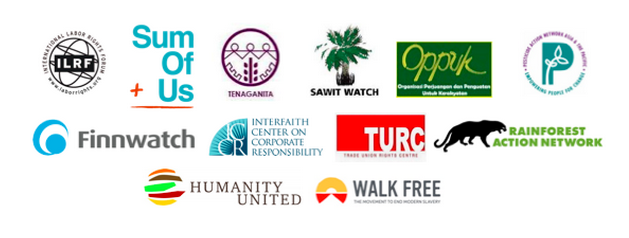Coalition of NGOs calls for robust labor audit and actions by the RSPO and buyers
FOR IMMEDIATE RELEASE
CONTACT: Emma Rae Lierley, 415.281.1989, emma@ran.org
San Francisco, CA – Following the Roundtable for Sustainable Palm Oil’s (RSPO) announcement that it will undertake a compliance audit of Malaysian grower Felda Global Venture’s plantations where serious human rights and labor abuses were recently exposed by a major investigative article from The Wall Street Journal, a coalition of international NGOs continues to monitor the process and call for a robust, independent investigation.
The coalition of civil society groups previously issued a statement calling on the Roundtable for Sustainable Palm Oil (RSPO) for an open investigation into the abuses. Conditions including human trafficking, forced labor, and withholding of wages were documented by The Wall Street Journal, all of which are violations of the RSPO’s Principles and Criteria, as well as basic human rights.
Following an initial response on August 3rd, the RSPO stated on August 14, 2015 that it will engage Accreditation Services International (ASI) to perform a compliance audit on the FELDA units situated in the area linked to the findings in the report and publish the results by the first week of October 2015. Problematically, the RSPO announced the date and location of the audit.
The coalition of NGOs has issued the following in response:
“We are encouraged that the RSPO will investigate the findings of serious human rights and labor abuses documented in Felda Global Venture’s plantations and that the full audit report will be released. However, the RSPO’s announcement of the audit date and sites already puts the integrity of the audit in jeopardy, as it allows Felda Global Ventures to prepare the sites in advance of the audit.
“To ensure the most robust results possible, the RSPO must assess the labor conditions at the plantation level–not only the mill–and follow best practices in labor assessments as outlined in Free and Fair Labor in Palm Oil Production: Principles and Implementation Guidance, including:
-
Conducting unannounced site assessments with full, unhindered access to the plantation and related facilities, including mills, living quarters, etc.
-
Assessing sub-contractors, including firms responsible for hiring and payroll and other third-party recruitment and employment agencies.
-
Prioritizing confidential worker interviews with a representative cross-section of the workforce, and ensuring protection of workers against reprisals.
-
Ensuring together with employers that worker representatives should have access to all relevant documentation and that they are invited to provide recommendations. Worker representatives should also participate in meetings to discuss findings by the auditor.
-
Reporting publicly on findings and corrective action plans. Ensure that the privacy and confidentiality of complainants and/or affected parties is protected.
-
Ensuring the independence and objectivity of the entity or individuals responsible for third-party verification.
“Given remaining questions about the audit process and its alignment with best practices in labor assessments, we are calling for independent observation by one of our coalition members. We also continue to call on international buyers, including Cargill, Wilmar, Procter & Gamble and Nestlé, to act immediately to independently and transparently investigate human rights and labor abuses in Felda Global Venture’s plantations.
“If Felda does not remedy all labor violations in a transparent manner, buyers must publicly sever all financial ties with the company, and the RSPO must uphold its own Principles and Criteria and suspend Felda’s membership until these very serious violations are proven to be remedied.”
###
To see TheWall Street Journal’s “Palm-Oil Migrant Workers Tell of Abuses on Malaysian Plantations,” visit
